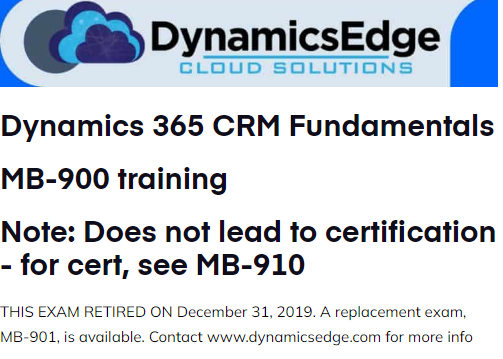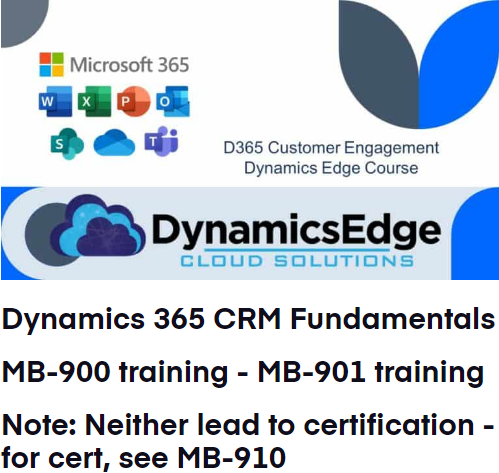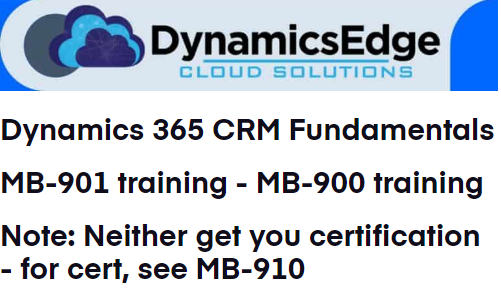Whether it’s July 2023, June, May, April, or sometime after July, Dynamics Edge has you covered for Dynamics 365 Fundamentals training options.
If you’re looking to get started with Dynamics 365 and possibly enhance your career prospects or boost your resume, it’s crucial to begin by understanding the fundamentals of both Dynamics 365 and Dynamics 365 CRM. Dynamics 365 is a comprehensive suite of cloud-based business applications designed to streamline operations, increase productivity, and improve customer engagement. Dynamics 365 is not only Dynamics 365 CRM; it may also include Dynamics 365 Finance and Operations (ERP), Dynamics 365 Business Central, Dynamics 365 for Retail, Dynamics 365 Commerce, Dynamics 365 Supply Chain Management, and more. Dynamics 365 CRM, on the other hand, is a subset that specifically focuses on customer relationship management capabilities, such as sales automation, customer service, and marketing automation.
To get started, familiarize yourself with Dataverse, a cloud-based data platform that underpins Dynamics 365 and other Power Platform apps. It’s important to know how Dataverse stores and manages data, ensuring a secure and scalable environment for your applications.
As you dive deeper into Dynamics 365, focus on key fundamentals such as data management, security, customization, and integration with other systems. By mastering these topics, you’ll have a solid foundation for understanding more advanced concepts and capabilities of the platform, enabling you to effectively configure, customize, and use Dynamics 365 to its full potential.
If you’re interested in pursuing a certification to boost your career prospects, consider the Microsoft Certified: Dynamics 365 Fundamentals certification, which is obtained by passing the MB-910 exam. This exam focuses on Dynamics 365 CRM fundamentals, such as configuring and managing Dynamics 365 CRM environments, managing data and security, and integrating with external systems.
Although the MB-910 exam is entry-level, passing it can serve as a strong starting point for your Dynamics 365 journey. With this certification, you’ll not only enhance your resume but also demonstrate your commitment to learning and mastering the Dynamics 365 platform.
After completing the MB-910 exam, you may want to explore more advanced Dynamics 365 certifications, such as MB-210 (Microsoft Dynamics 365 Sales) or MB-230 (Microsoft Dynamics 365 Customer Service). These certifications will help you specialize in specific areas of Dynamics 365, making you a valuable asset to potential employers and allowing you to further your career in the field.
Even without pursuing certifications, understanding the fundamentals that were covered in the MB-900 or MB-901 exams can be invaluable for newcomers to Dynamics 365. Even that knowledge could enable you to effectively use and customize the platform to meet your organization’s specific needs and provide a strong foundation for future learning and growth within the Dynamics 365 ecosystem.
UPDATE: If you are looking for MB-900, note that THIS EXAM RETIRED ON December 31, 2019. A replacement exam, MB-901, is available.
UPDATE: Even for MB-901, note that for MB-901: THIS EXAM RETIRED ON JUNE 30, 2021. Two replacement exams, MB-910 and MB-920, are available. For more information, visit the MB-910 and MB-920 exam details pages.”
Essentially, as of June 30, 2021, the non-certification-bearing Dynamics 365 Fundamentals exams don’t really exist anymore, and this is now incorporated into the MB-910 and MB-920 exams.
Understanding Dynamics 365 for greater success
When understanding Dynamics 365 and Dynamics 365 CRM, it’s important to start with the fundamentals. Investing time in learning the fundamentals of Dynamics 365 and potentially pursuing relevant certifications can significantly enhance your career prospects and make you a more competitive candidate in the job market. Start by mastering the basics, and then build on that foundation to expand your knowledge and skills in the Dynamics 365 landscape.
Some fundamental concepts to know include cloud concepts, deployment methodologies, configuring and managing Dynamics 365 environments, managing data and security, and integrating Dynamics 365 with external systems. Other important concepts are configuring and using Dynamics 365 apps and modules, understanding reporting and analytics, working with Power Platform apps and services, troubleshooting and monitoring Dynamics 365 performance, understanding the Dynamics 365 licensing model, and staying up-to-date with updates and releases.
When it comes to MB-910, you should be familiar with configuring and managing Dynamics 365 CRM environments, managing data and security in Dynamics 365 CRM, integrating Dynamics 365 CRM with external systems, and configuring and using Dynamics 365 CRM apps and modules. Additionally, understand Dynamics 365 CRM reporting and analytics, troubleshooting and monitoring Dynamics 365 CRM performance, working with customization options, managing workflows and processes, working with forms and views, and staying up-to-date with updates and releases.
For MB-210, which focuses on Dynamics 365 for Sales, key concepts include understanding the application and its capabilities, configuring and managing Dynamics 365 for Sales environments, managing data and security, and integrating Dynamics 365 for Sales with external systems. Furthermore, you should know how to configure and use Dynamics 365 for Sales apps and modules, understand reporting and analytics, work with customization options, manage workflows and processes, work with forms and views, and stay up-to-date with updates and releases.
By familiarizing yourself with these fundamental concepts, you’ll be well-equipped to expand your knowledge and skills in the Dynamics 365 landscape, making you a more competitive candidate in the job market and enhancing your career prospects.
Have a Question ?
Fill out this short form, one of our Experts will contact you soon.
Call Us Today For Your Free Consultation
Call Now


